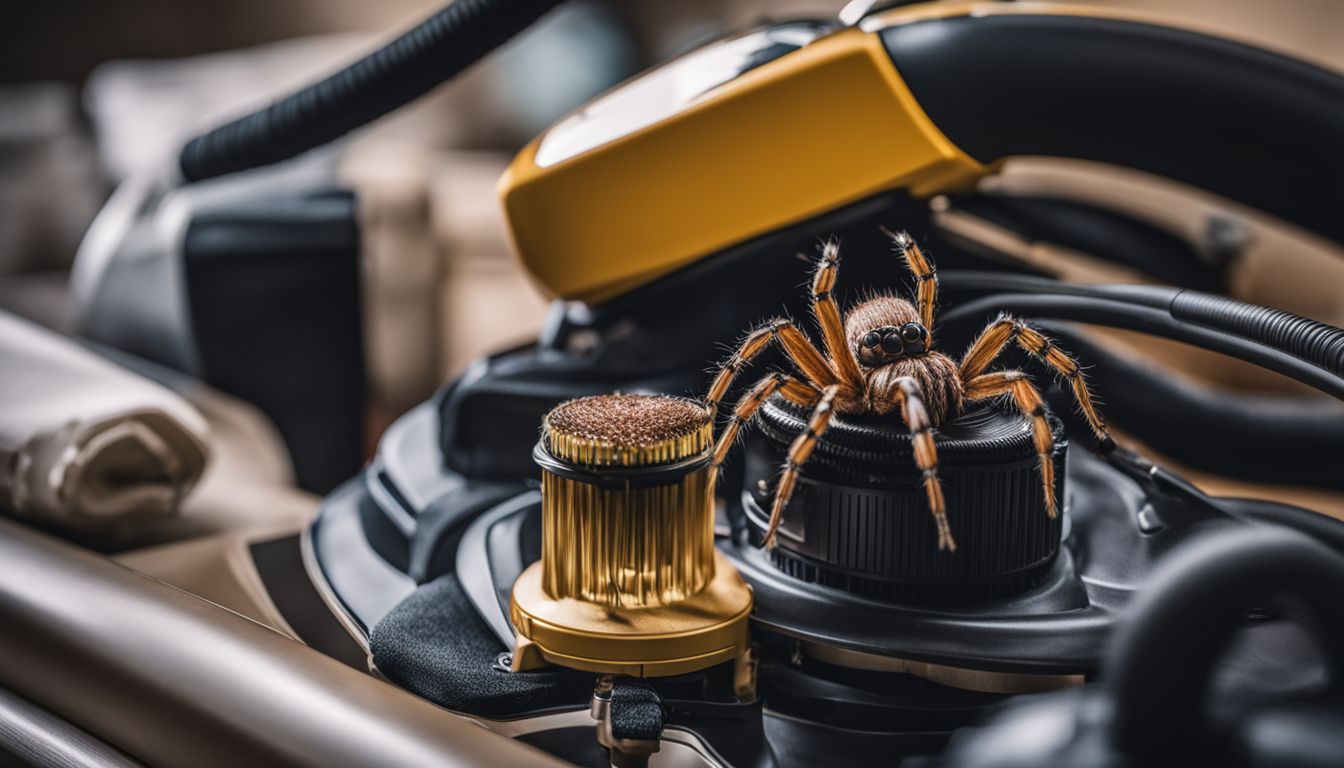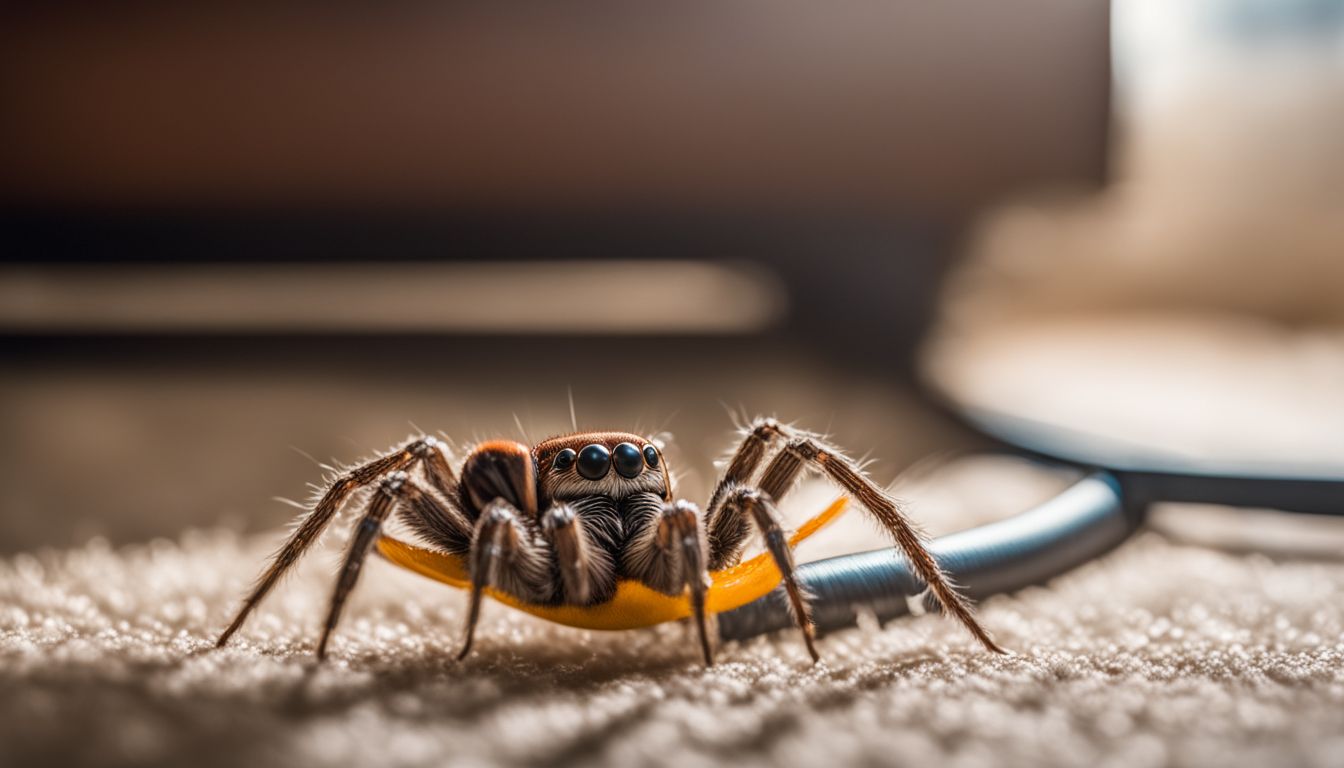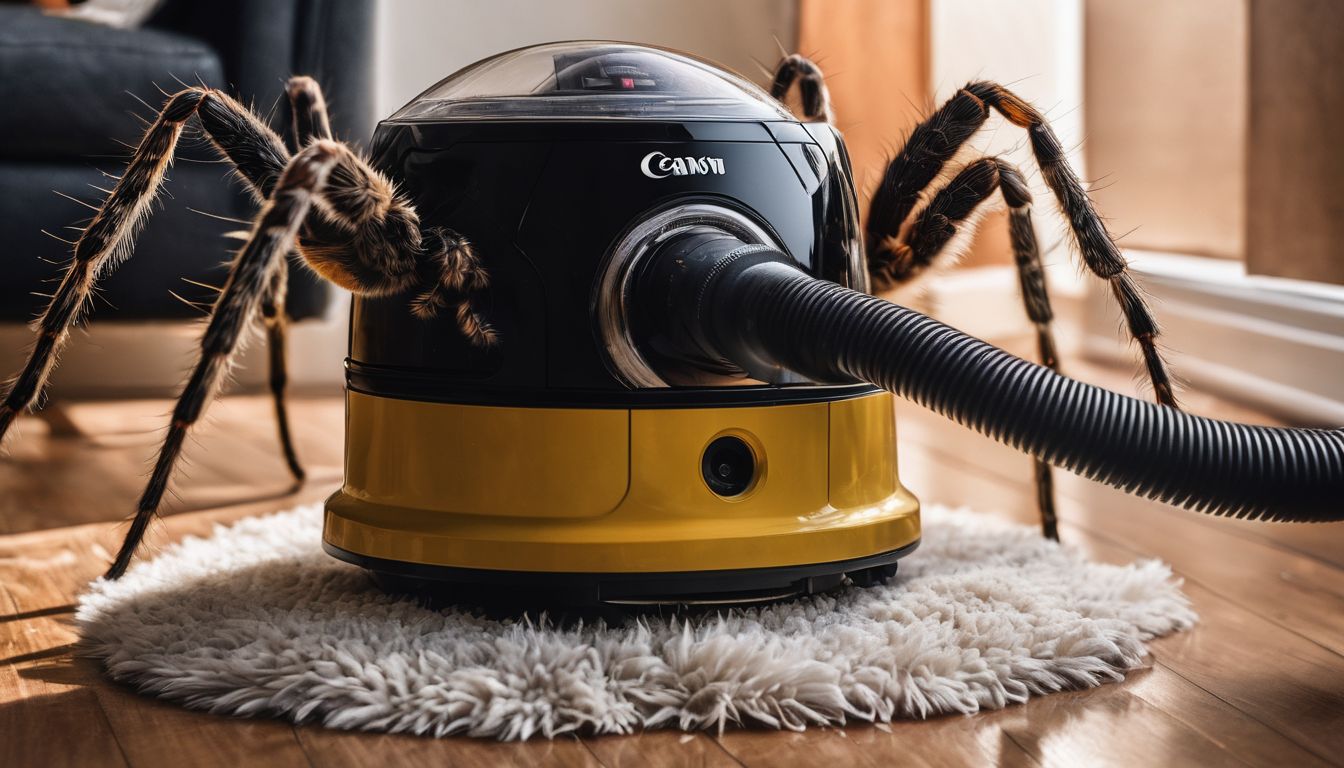Have you ever wondered if your vacuum cleaner is the final destination for spiders in your home? Many believe that vacuums spell certain doom for these eight-legged critters. This blog post will explore whether our household helpers are effective spider terminators or unexpected survival pods.
Keep reading to uncover the surprising truth!
Key Takeaways
- Vacuum cleaners can be deadly for small, fragile spiders due to their strong suction power, but larger spiders have a better chance of surviving the vacuuming process.
- Spiders trapped in bagless vacuums might escape if they avoid injury during suction, while the factors influencing their escape include size, strength, agility, web-spinning ability, suction power of the vacuum and duration of vacuuming.
- Ethical considerations should be taken into account when removing spiders using vacuums. Alternative spider control methods such as natural repellents and regular cleaning are effective ways to prevent spider infestations without relying solely on vacuuming.
- Regular cleaning by decluttering and using natural deterrents like vinegar spray or essential oils can help keep spiders at bay. Understanding the predator-prey relationships within the ecosystem emphasizes the delicate balance necessary for ethical spider control strategies.
The Science of Suction: Do Vacuums Kill Spiders?

Do vacuums actually kill spiders? We’ll explore the impact of vacuum cleaner type and spider size on their survival odds.
Spider’s size and survival odds
Some spiders are big, some are small. Size matters when they face a vacuum cleaner. Bigger spiders have a better chance of living through the rough ride inside a vacuum cleaner. They might get bumped around but can come out alive on the other side.
Tiny spiders aren’t as lucky. They often don’t make it because their bodies are too fragile. The powerful force and bumping into hard parts inside the vacuum can hurt them too much to survive.
The impact of vacuum cleaner type on spider fate
The type of vacuum you use can significantly influence whether a spider survives the ordeal of being vacuumed up.
| Vacuum Cleaner Type | Impact on Spiders |
|---|---|
| Upright Vacuums | Strong suction may harm fragile spiders |
| Handheld Vacuums | Lower suction could allow for spider survival |
| Robot Vacuums | Varied results due to differing suction powers |
| Bagged Vacuums | Spiders may suffocate inside sealed bags |
| Bagless Vacuums | Spiders might escape from canister after shutdown |
| Wet/Dry Vacuums | Liquid may drown spiders or impede their escape |
| Central Vacuum Systems | Long hoses increase travel time, reducing survival odds |
Upright vacuum cleaners typically possess strong suction power, which can be deadly to small, delicate spiders. Handheld models, on the other hand, have less suction strength, giving some spiders a chance to survive. The varying suction capabilities of robot vacuums can lead to unpredictable outcomes for any trapped spiders. Bagged vacuum cleaners often seal spiders away from air, leading to suffocation, while spiders caught in bagless vacuums could potentially escape when the vacuum is turned off. Wet/dry vacuums pose a unique hazard as spiders may drown if sucked into liquid. Lastly, central vacuum systems involve long travel distances within the system, making it less likely for spiders to survive the journey.
Can Spiders Escape from Vacuums?

Do spiders have a way out once they get sucked into a vacuum? We’ll explore the possibility of their escape from bagless vacuums and the factors that may influence it.
The case of bagless vacuums
Bagless vacuums might seem like a spider’s worst nightmare. These cleaners suck up spiders without a bag to trap them. Once inside, some spiders face death by low pressure or get hurt badly.
Others can survive the trip into the vacuum but might not make it much longer after that, as they could die from thirst.
But it’s not all bad news for our eight-legged friends; some can escape from bagless vacuums if they avoid getting injured during suction. These lucky ones find their way back out and go on with their spider lives.
Now, let’s look at what happens when spiders try to dodge vacuums altogether.
Factors influencing a spider’s escape
When considering factors that influence a spider’s escape from a vacuum, several important aspects come into play. These include:
- Spider’s size: Smaller spiders may find it easier to navigate through the suction mechanism of vacuums, increasing their chances of escape.
- Strength and agility: Spiders with strong legs and agile movements may be more likely to resist being sucked into the vacuum or to wriggle free if they do get drawn in.
- Web-spinning ability: Some spiders might instinctively weave webs within the vacuum, potentially providing them with an anchor or means of escape.
- Vacuum suction power: Stronger suction makes it harder for a spider to resist being pulled in, reducing its chances of escape.
- Duration of vacuuming: If a spider isn’t immediately crushed or asphyxiated when sucked in, the duration of vacuuming can also impact its chances of survival or escape.
Ethical Considerations in Vacuuming Spiders
Explore the debate on humane spider removal and alternative spider control methods to consider the ethical implications of vacuuming spiders.
The debate on humane spider removal
Some people believe that vacuuming up spiders is cruel. They argue that it’s not humane to kill spiders this way. This ethical consideration has sparked a debate about the most compassionate way to remove spiders from our homes.
In fact, there are searches on the internet asking if it’s cruel to vacuum spiders and whether they can lay eggs in a vacuum. This shows that many people are interested in finding gentle ways to deal with these creatures while considering their well-being.
Alternative spider control methods
- Natural repellents: Use essential oils like peppermint, citrus, or tea tree oil to deter spiders. They dislike the strong scents and will avoid areas treated with these oils.
- Seal off entry points: Use caulk to seal cracks, gaps, and other potential entry points around windows, doors, and baseboards. This prevents spiders from entering your home.
- Spider traps: Place sticky traps in areas where spiders are commonly found. These traps capture spiders without harming them and allow for easy removal.
- Regular cleaning: Vacuum and dust regularly to remove spider webs, eggs, and prey insects. This reduces the spider-friendly environment in your home.
- Reduce clutter: Keep your living space tidy as clutter provides hiding spots for spiders. Regularly decluttering can discourage spiders from making themselves at home.
- Outdoor maintenance: Trim vegetation and remove debris around your home’s perimeter to reduce outdoor spider populations from encroaching indoors.
- Good lighting: Install bright exterior lights as they can deter spiders that prefer dark corners and crevices.
- Professional pest control: Consider enlisting the help of a professional pest control service for persistent spider infestations or if you are uncomfortable dealing with them yourself.
Understanding these alternative methods can help you maintain a spider-free living space without relying solely on vacuuming them up.
Tips for Preventing Spider Intrusions
Keep your home clean by regularly vacuuming and decluttering to reduce the likelihood of spiders finding a cozy spot to nest. Consider using natural deterrents such as essential oils or electronic repellents to keep spiders at bay.
Regular cleaning strategies
Regular vacuuming can be an effective strategy for keeping spiders at bay. By frequently vacuuming floors, carpets, and corners, you can remove spider webs and eggs, lowering the chances of a spider infestation in your home.
Bagless vacuums are helpful as they allow you to see captured spiders easily and safely release them back into their natural habitat.
Remember to regularly clean areas where spiders are likely to hide or build webs, such as behind furniture and in hard-to-reach corners. Maintaining a clean living space not only reduces the population of spiders but also helps create a more comfortable environment for you and your family.
Natural deterrents and repellents
Regular cleaning strategies can help keep spiders at bay, but if you want to take extra measures, natural deterrents and repellents can be effective in preventing spider intrusions. Here are some easy and effective natural ways to keep spiders away from your home:
- Vinegar spray: Create a solution of water and vinegar and use it to spray around windows, doors, and other entry points to deter spiders.
- Citrus peels: Spiders dislike the scent of citrus. Place citrus peels in areas where spiders are likely to enter, such as window sills or near doors.
- Essential oils: Peppermint, tea tree, and lavender oils can be mixed with water to create a spider-repelling spray.
- Diatomaceous earth: This natural substance can be sprinkled around the perimeter of your home to create a barrier that spiders will avoid.
Understanding Spider Predators and the Ecosystem
Spiders have natural predators like mice and birds, which play a role in balancing the ecosystem. Understanding these predator-prey relationships can provide insight into the broader food chain context and its impact on spider control strategies.
Do mice eat spiders?? Linking to the broader food chain context
Mice are known to eat spiders and insects, among other things. This makes mice natural predators of spiders in the ecosystem. Spiders play a vital role in the food chain by controlling insect populations, which helps maintain balance in nature.
When mice consume spiders, it impacts not only the spider population but also the insect population, demonstrating how interconnected and delicate the food chain is.
Understanding these interactions can help us appreciate the importance of maintaining ecological balance by considering the impact of our actions on various species’ populations.
Conclusion: Balancing Efficiency with Ethics in Spider Control
In conclusion, understanding the impact of vacuums on spiders is essential for finding a balance between effective pest control and ethical treatment of living creatures. While vacuums can capture spiders, their survival inside varies based on size, type of vacuum, and even escape possibilities.
It’s important to consider humane spider removal methods and prevention strategies to maintain a harmonious coexistence with these beneficial predators in our homes.
To delve deeper into the fascinating dynamics of the food chain and to learn whether mice are natural predators to these eight-legged creatures, explore our detailed article, Do Mice Eat Spiders?
FAQs
1. Can a vacuum cleaner kill spiders?
Yes, when you use a vacuum to suck up a spider, it often gets trapped in the vacuum bag where it can’t survive for long.
2. What happens to spiders on places like the International Space Station?
Spiders in space, like on the International Space Station, live in low gravity which is kind of like constant weightlessness and they adapt by changing how they make their webs.
3. Do spiders need gravity to shed their skin?
No, spiders don’t need gravity to shed their skin; shedding happens as part of their growth process no matter where they are—on Earth or in space!
4. Is there such a thing as a spider hospital in a vacuum cleaner?
No, there’s nothing like a “spider hospital” inside your vacuum cleaner; once sucked up into the bag, spiders usually don’t make it out alive.




